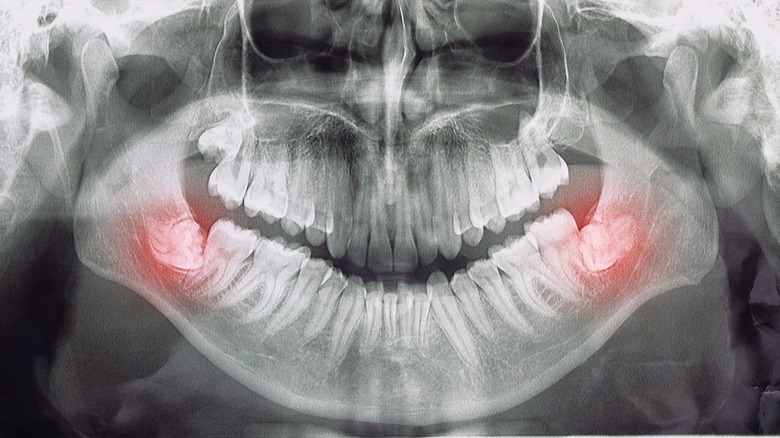Most people are lucky enough to not remember the painful and dramatic experience of teething during early childhood. While most teeth develop and break through the gums early in life, wisdom teeth are often a bit late to the party. The teeth commonly referred to as “wisdom teeth” are a third set of molars at the very back of the jaw. Typically, there are four total wisdom teeth with two on top and two on the bottom. These late-arriving molars typically don’t begin to emerge until sometime between ages 17 and 21, according to Healthline. However, in most instances, the teeth have to be surgically removed due to the teeth being impacted. A 2024 study cited 72% of Swedish people in the 20- to 30-year age range having at least one impacted wisdom tooth.
According to Healthline, an impacted tooth is one that has been blocked from fully emerging through the gums. A tooth can be partially impacted, only having a small portion of the total tooth being above the gum line, or it can be fully impacted where no part of the tooth breaks through. Impacted teeth are prone to infection as they are often more difficult to clean, leaving room for bacteria and food particles to build up. Additionally, impacted teeth can cause cysts and damage to other teeth, per Mayo Clinic. While it’s possible for any tooth to become impacted during adolescence, the real reason wisdom teeth become impacted may be surprising.
Why do wisdom teeth become impacted?

Tooth impaction, according to Healthline, is typically caused by overcrowding. In the case of wisdom teeth, the human jawbone simply does not have enough space to support the third set of molars, even though these teeth are still present. The modern human’s jaw is a bit smaller when compared to our Neanderthal ancestors, according to a 2007 study published in Proceedings B.
But why are there teeth when there isn’t room for them to fit? The subject has been pondered by archeologists for quite some time, according to Scienceline. Their conclusion is that our primal ancestors did not have the same capabilities in terms of food processing, so Mother Nature stepped in. Slate explains that the utensils they had available for eating their mostly meat diet were limited to primarily their teeth and hands. Thus, the jaw was wider to accommodate the need for better mastication (via Scienceline).
Scienceline explains that today, wisdom teeth are classified as a vestigial organ or an otherwise useless body part. When the wisdom teeth begin to emerge, impaction is most commonly the result. The most frequent treatment for impacted wisdom teeth is to have them removed (via Mayo Clinic).
Can I prevent impaction?

While you may be looking for a way to prevent your wisdom teeth from becoming impacted, there’s not much that can be done. Healthline explains that the majority of people have their wisdom teeth emerge between the ages of 17 and 21, but in some cases, they can come in earlier or later in life. In most cases, your dentist will recommend surgical removal of your wisdom teeth, according to Medical News Today. Practicing proper oral health care, such as regular brushing and flossing is a good way to help reduce the risk of periodontitis, or inflammation in the gums. Mayo Clinic suggests maintaining regular six-month visits can help to detect problems at their earliest arrival, which may prevent pain and infection. Additionally, your dentist may be able to identify and monitor your wisdom teeth prior to their emergence to decide if removal is needed.
An impacted wisdom tooth can be painful and debilitating. Be sure to reach out to your dentist if you suspect that your wisdom tooth has become impacted.




